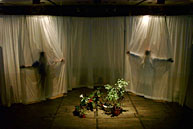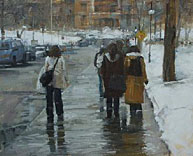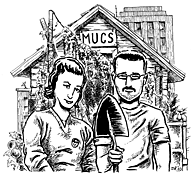On campus
Operating theatre
 Photo: Richard Gagnon
Photo: Richard Gagnon |
|
The cozy J. Armand Bombardier Theatre at the McCord Museum is home to a series of hour-long documentary plays dealing with aspects of health care in Quebec. There are two installments left in this seven-part series: The Nurse, playing at 8 pm, May 21 and 22, and The Patient, set for the same time on June 18 and 19.
Annabel Soutar is the artistic director and co-founder (with husband/stage director Alex Ivanovici) of Projet Porte Parole, the company mounting the plays. She cut her teeth on the documentary theatre genre at Princeton. The name, Porte Parole, literally (and bilingually) encapsulates her aim to make theatre "carry" debate on issues out to the public. Too much of our news, she feels, is from the passive media of broadcast and print. By turning current events into plays, then initiating a moderated discussion after each piece, she hopes to stimulate more action in the community on important issues. Soutar says, "We ask the audience: what do you want to see?"
First-time playwright Chris Clark, who has a journalism degree from University of King's College in Halifax and a computer science background, is creating the text for The Nurse. "Work on this play is more journalistic than creative for me," says Clark. His 20 interviews with nurses, nurse administrators, educators and union representatives resulted in 11 hours of tape, edited down to approximately an hour of theatre. Subjects spoke to him under conditions of anonymity, to let them feel free to speak their minds, and to ease the particular stories towards the general. According to Clark, "It's a lot of work, but not something you do for the money."
Soutar wonders whether the McCord venue with its largely university-based audience is a little staid for such potentially explosive theatre. (Her project was turned down by the city's Maisons de la Culture because her material was "too political.") Still, the debate following the plays, as exemplified by last April's The Hospital, is spirited. The makeup of panels for the next two productions is not set yet, but participants have included Antonia Maioni, Director of the McGill Institute for the Study of Canada and Dr. Hugh Scott, Executive Director of the McGill University Health Centre. "We want to have a nice mix of French and English," says Soutar.
Productions in 2004 will treat integration of immigrants into neighbourhoods, and gene-based research in Montreal. "I'm sure that by next year, we will see a cloned human being," Soutar predicts. Much more information, plus multimedia and a message board can be found at www.porteparole.org.
Jack Ruttan
Writing his peace
Vern Neufeld Redekop knows conflict resolution. Not the kind where the UN blue berets park themselves between antagonists, but getting right down to the roots of the dispute. Redekop is the past president of the Canadian Institute for Conflict Resolution, and a professor at the University of Ottawa. As if these weren't enough credentials, his latest book contains a forward from Nobel Prize winner Desmond Tutu.
Redekop will be on campus on May 9 to launch his new book From Violence to Blessing, which looks behind the headlines and uncovers the roots of the deep hatreds that lead to violence world wide. Sharing his extensive experience, Redekop shows how deep-rooted conflict and violence can slowly be transformed into peace and reconciliation. He will also be speaking on CBC's Current Affairs program (88.5 FM) from 1 till 2 p.m. that afternoon.
Book Launch of From Violence to Blessing by Vern Neufeld Redekop, McGill University Bookstore Café, 3:30 to 6:00 p.m. Co-sponsored by First People's House and the McGill Institute for the Study of Canada.
Campus on canvas
 Painting: Mark Lagüe
Painting: Mark Lagüe |
|
We may not know much about art here at the Reporter, but we know what we like. And we like McGill. Montreal-based painter Mark Laguë does too. The award winning artist's oil paintings will be on display in the MacDonald-Harrington from May 9 to May 23.
The thirty canvases depict students at work and play on the campus, lounging on the steps of the arts building. (How he managed to get them to sit still for so long is probably a secret most professors would kill to know.)
Though some aspects of the McGill milieu lend themselves to being rendered by brush and pigment, Laguë's paintings don't stick to the tried and true. Sure, Queen Victoria in her regal splendor remains unamused by the students chatting behind her back in front of Strathcona, and the Arts building as seen from the Roddick gates looks lovely as always.
But who ever paused to ponder, the geometric aesthetics of a campus bike rack? Or tried to capture the sense of expectation of commuters waiting at the Dr Penfield bus stop?
The McGill Series: Paintings by Mark Laguë, Sponsored by the Marchant Gallery, Monday through Friday. Open till 6:00 pm on Thursdays, MacDonald-Harrington Building, Rm 114.
Sustainable volunteering
 |
|
Students who are searching for a meaningful volunteer opportunity this summer may want to investigate openings with the McGill University Community Sustainment project (MUCS). The brainchild of McGill School of Environment student Spencer Mann, MUCS is "dedicated to the creation of a totally sustainable urban residence, community centre and educational space for McGill students and Montreal citizens."
While attending university senate meetings, Mann became aware of a recurring theme: McGill's desperate search for residence space. So last semester Mann created MUCS to propose some viable solutions.
"The ultimate goal is to create a sustainable housing co-operative for 200 residents, 30 percent of whom would be non-students." The co-op would double as a local community centre, providing space for neighbourhood events and meetings. Resident community members would also participate in local community service programs such as composting, food distribution, and after-school mentoring and tutoring.
While Mann recognizes it may be a few years before this vision is realized, he has already built up support at McGill. Over the past few months, he approached various faculties to put together a design workshop. Starting this fall, students from the School of Environment, Urban Planning, Architecture and Engineering will explore concepts such as cooperative community structure, people-centred architecture, sustainable design, and neighbourhood services and advocacy. Mann says, "The work of students and faculty will then be synthesized through several round-table discussions over the course of the semester."
There are strong proponents of this co-operative initiative outside of McGill, too, such as sustainable architect Mark Poddubiuk, City Councilor Dida Berku, Montreal Executive Committee member Allan DeSousa (responsible for sustainable development), and members of Montreal's Urban Ecology Centre. Mann is collaborating with the municipal government's Youth Commission, also interested in finding innovative housing solutions.
According to Mann, "Students are welcome to become involved in four targeted areas over the summer; finalizing academic details for the design workshop, urban planning, fundraising, as well as website and brochure design. And of course we can always use administrative help too!"
The McGill School of Environment has generously donated office space to MUCS. Located on the first floor at 3534 University, MUCS members will be working regular office hours all summer. You can reach them by phone at 398-1829.

